|
AFG looks into a (bleak) future?
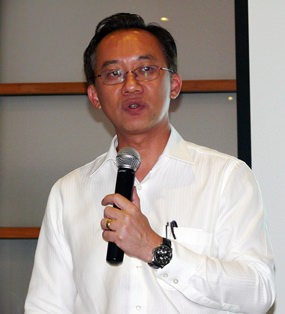
Chaiyant Savanachai, the Deputy Managing
Director of Thai Steel Cable Public Company Limited says, “To survive, you
need to go global.”
Dr. Iain Corness
The Automotive Focus Group (AFG) was addressed by Chaiyant
Savanachai, the Deputy Managing Director of Thai Steel Cable Public Company
Limited. Chaiyant is very well qualified to comment on the Thai automotive
sector, having a Bachelor Degree in Engineering from King’s Mongkut
Ladkrabang, Master of Art in International Economics from Temple University
Japan, a PhD in International Organization Management from the American
University of London, combined with undoubted expertise in Manufacturing
Strategy and Operations.
He began his discourse with the words, “Thailand’s auto industry is not in
good shape.” With Thai Steel Cable supplying many of the OEM’s he could see
at first hand just how the OEM’s were doing. In his company, they had the
capacity for two shifts daily, but were currently only running one. Other
Tier 1 and Tier 2 suppliers were in a similar position.
Chaiyant then made the AFG members aware of the true situation in Thailand
where rice prices are almost 50 percent down on the (artificially inflated)
pledged rice prices of 2013.
That picture was also seen in the rubber producers with the market price
also 50 percent down.
Unsold new vehicles were mounting up with an estimated 50,000 in warehouses.
Other sectors such as agriculture, fishing and the garment industry were
also in trouble, and it is obvious that Thailand is relying on government
spending to reverse the picture.
Chaiyant then addressed the issues with the forthcoming AEC at the end of
2015. Principal among these was just the sheer population inequality with
Indonesia having three times the number of people compared to Thailand. As
Indonesia’s industries grow, it has a huge number of people who will want
cars and motorcycles.
Whilst Indonesia’s demands for product will assist their motor industry, the
quality of the final goods does not do well in comparison with Thailand, and
Chaiyant felt that Indonesia will need parts from Thailand.
He has a long range plan for Thai Steel Cable which will assist his company,
but planning needs to be done. His final words were: “To survive, you need
to go global.”
|

|
Draft law on amending intellectual property rights under consideration
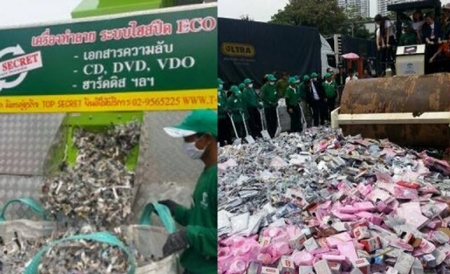
A draft law amending Thailand’s intellectual property
rights is expected to be approved by the National Legislative Assembly (NLA)
and enforced soon, according to Deputy Commerce Minister Apiradi Tantraporn.
Apiradi’s remarks were made last Thursday while witnessing the annual
destruction of seized goods violating IPR, worth Bt2 billion, considered to
be the highest value of pirated goods ever destroyed by Thailand.
Counterfeit goods weighing some 80 tonnes consisted of clothing, handbags
and luggage, watches, auto spare parts, and more, went up in smoke was also
witnessed by senior officials of the Royal Thai Police, the Customs
Department and other government agencies.
Apiradi said violations of intellectual property in Thailand have declined
as the interim government has paid extra attention to the issue, and related
agencies have also cooperated.
At present Thailand is on the United States government’s Priority Watch
List, she said. It is hoped that several countries, especially the United
States, would be satisfied and reconsider Thailand’s place on the list as
the amending law is expected to be approved soon, she said.
The destruction of goods violating IPR is to ensure manufacturers of genuine
goods that IP infringements receive attention by Thai authorities and to
ensure that counterfeit goods would not be exported. (MCOT)
|

|
NESDB organizes brainstorming session on developing people
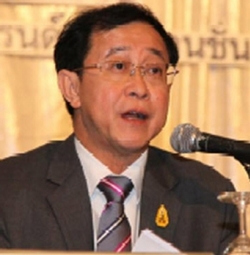
Transport Deputy Minister/NESDB
Secretary-General Arkhom Termpittayapaisith.
Thailand’s National Economic and Social Development Board (NESDB) last week
held its annual brainstorming session entitled ‘Developing People for
Thailand’s Future.’
Participants at the session included Transport Deputy Minister/NESDB
Secretary-General Arkhom Termpittayapaisith, Mahidol University Council
chairman Dr Vicharn Panich, Bangkok Bank executive chairman Kosit
Panpiemras, and Suphachai Chearavanont, president and CEO of True Corp Plc.
Arkhom told those attending the session that Thailand is going to see
several sharp changes in the future, including becoming an aged society,
while residents of big cities imitate Western lifestyles, technology and an
environment becoming deteriorated.
Asia is important to the global economy, he said, affecting Thais and Thai
society. Because of these factors, it is essential for Thailand to develop
its population in order to develop the country, solve social divisiveness
and achieve sustainable development.
The NESDB, he said, wants to propose achieving human development leading to
creating secure lives, family happiness and the economy.
The agency is also proposing human development measures before production
begins, and future service, as well as improving the urban environment aimed
at raising the quality of life, he added. (MCOT online news)
|

|
Japan asks Thailand for higher steel import quota
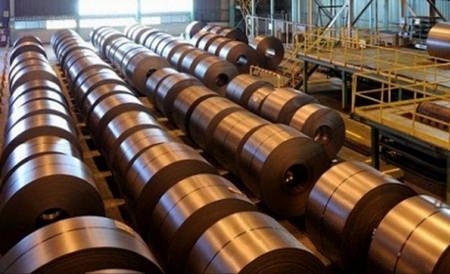
Japan said it wants Thailand to increase the quota of steel imports with
tariff discounts to feed its offshore automobile production.
Hisamichi Koga, president of the Japanese Chamber of Commerce (JCC) in
Bangkok, and Masayasu Hosumi, president of the Japan External Trade
Organization (JETRO), also in Bangkok, asked Thai Industry Minister
Chakramon Phasukavanich to increase the quota for Japanese steel imports to
support automotive production that is expected to rise 25 percent from 2
million units this year to 2.5 million next year.
They referred to the steel import quota with tariff discounts under the
Japan-Thailand Economic Partnership Agreement (JTEPA).
At present, 50-60 percent of steel imports that are used enjoy the tariff
privilege.
In response, the minister told the JCC and JETRO Bangkok heads to ask the
Japanese government to first fully comply with the terms under the JTEPA.
In addition, JCC and JETRO want the Thai Industrial Standards Institute to
relax its inspection of steel production standards in Japan. The institute
requires the annual inspection.
Chakramon said he would have the institute conduct the inspection every two
years instead. The response satisfied the two Japanese organizations, he
said.
The minister added that the JCC and JETRO representatives confirmed Japanese
operators in Thailand are interested in increasing their investment in the
country, especially in the automotive industry. (MCOT)
|

|
Tourism Council of Thailand
proposes extension
of New Year’s holiday

Piyaman Tejapaibul, Tourism
Council of Thailand chairperson.
The Tourism Council of Thailand (TCT) has proposed an
extension of Thailand’s long New Year holiday, one of the tourism stimulus
measures for the Tourism and Sports Ministry to forward to the Cabinet for
consideration, said Piyaman Tejapaibul, TCT chairperson.
She said the New Year’s extension would include five days off from December
31 this year through January 4 next year.
Piyaman proposed the idea when she met with Tourism and Sports Minister
Kobkarn Wattanavrangkul last week.
A study conducted by the Faculty of Economics, Chulalongkorn University
found that 36 percent of the public will travel during the New Year holiday.
The additional day off will increase travel rate by 26 percent to 62
percent.
The minister will forward the proposal to the Cabinet meeting, she added.
Regarding the murder of two British tourists on Ko Tao, she said the council
instructed local members to cooperate with the authorities in stepping up
security measures for tourists.
She recommended that the government strictly punish the culprits to prevent
recurrence of the incident. (MCOT)
|

|
ASEAN to integrate power supplies to cut costs
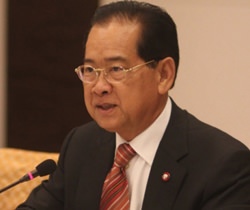
Thai Energy Minister
Narongchai Akrasanee.
The 32nd ASEAN Ministers on Energy Meeting (AMEM) agreed
to integrate the ASEAN energy market including electrical power trading
among countries in the region to cut electricity generation costs and boost
the global competitiveness of the region.
The agreement resulted from the AMEM held at the Don Chan Palace Hotel in
Vientiane last week.
AMEM issued a joint statement on an electricity trading project between
Laos, Thailand, Malaysia and Singapore. The project can turn Thailand into a
trading hub for electricity.
Thai Energy Minister Narongchai Akrasanee said the four countries agreed in
principle that the project would begin with Laos selling electricity
directly to Singapore, some 2,000 kilometers distant.
Tentatively, Singapore will buy an initial 100 megawatts from Laos. The four
countries will form a joint committee to study technical issues and the
price for the power trade. Thailand will host a meeting of the committee in
November.
“The good thing is that the ASEAN Power Grid project will begin and
progress,” the energy minister said.
The AMEM also discussed gas pipeline development because there would be
transnational gas trade in the future, he said. (MCOT)
|

|
|

